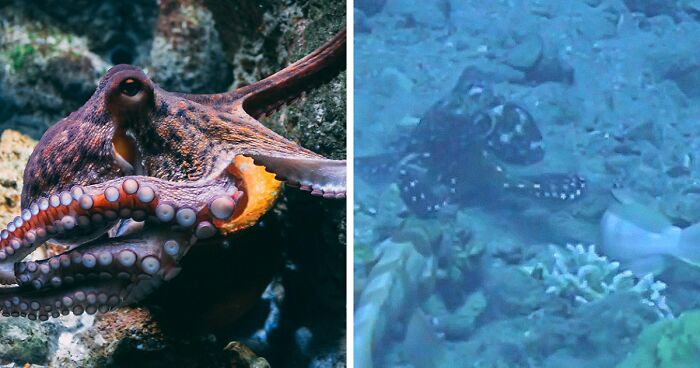
Rare Video Shows Octopuses Punching Their Lazy Fish Partners While Out Hunting Together
Interview With ExpertThis article has been updated to include comments from Eduardo Sampaio, a postdoctoral researcher at the Max Planck Institute of Animal Behavior.
Turns out, octopuses aren’t just the solo masterminds of the sea—they actually enjoy teaming up with other fish to form multi-species hunting parties.
But when things don’t go their way, octopuses have been caught slyly punching their underwater teammates as a form of disciplinary action.
- Researchers have found that octopuses team up with various fish to form multi-species hunting groups.
- The collaboration allows fish to access prey they can't reach and octopuses to conserve energy.
- When things don’t go their way, octopuses have been caught slyly punching their underwater teammates as a form of disciplinary action.
- “We are very similar to these animals. In terms of sentience, they are at a very close level or closer than we think toward us,” said the lead researcher of the new study.
Researchers of a new study have found that octopuses do not always hunt alone. Some members of the species, Octopus cyanea, forage around in hunting groups with other fish. These groups of fish can even include more than one species.
Octopuses have been spotted joining forces with other fish to lead multi-species hunting teams
Image credits: Diane Picchiottino (not the actual photo)
Image credits: NPG Press
“In the case of the octopus, we are talking about an animal that has very limited interactions with individuals of its own species. It must learn these social rules directly from individuals that are completely different from itself,” Eduardo Sampaio, a postdoctoral researcher at the Max Planck Institute of Animal Behavior and the lead author of the study, told Bored Panda and others.
“I find this fascinating. We now want to study better the role that each species plays in these multispecies aggregations, as well as the types of communication involved, to better understand how cognitively complex these interactions can be,” he said via email.
When it comes to hunting in a team, the benefits are mutual: the patrolling fish alert the octopus when they locate a prey, and when the octopus flushes it out of hard-to-reach crevices, the fish are waiting to swoop in.
“The octopus given its flexible morphology can inspect each crevice using its flexible arms and close it down with its interbracheal web (what we call a ‘web-over’),” Eduardo explained. “Thus, when these different predators are together, discovered prey is left with a dire choice: either it stays in the crevice and is eaten by the octopus, or tries to escape (as these items are usually faster than the octopus) but is caught by the fish.”
“We are very similar to these animals. In terms of sentience, they are at a very close level or closer than we think toward us,” said the lead researcher of the recent study
Image credits: NPG Press
Image credits: maxplanckpress
This hunting process is like an underwater version of teamwork, where everyone has their role and everyone reaps their own benefits.
“This beneficial interaction enables fish to acquire otherwise unreachable prey, and octopuses to conserve energy by focusing on high-quality food sources, while exerting control and providing feedback within the group, highlighting the sophisticated dynamics of marine life collaboration,” the long-time cephalopods observer said.
“When the octopus catches the prey it also kills it,” he added. “One item of prey is not divided, it is taken by whoever catches the prey first! However, because the interaction between the fish and octopus repeat several times during a hunt, prey is ‘shared’ in the sense that sometimes the octopus catches the prey, and other times fish catch the prey.”
The researchers of the study came to their conclusions based on dives conducted at a reef off the coast of Eilat, Israel.
With the help of several cameras, the team tracked 13 octopuses for about 120 hours and observed them for 13 hunts.
Octopuses flush prey out of hiding spots for the fish to grab, but if a fish slacks off, the octopus has been caught on camera throwing a punch to keep the hunt on track
Image credits: UniKonstanz
The team noticed that each octopus would work with groups of two to 10 fish at a time. They have also captured octopuses punching their teammates when they fall out of line.
Octopuses may also punch the fish to prevent them from being stuck in the same spot and to keep the group moving.
“We see that fish that contribute very little to the movement of the group and in creating prey opportunities (i.e. actively looking for prey) get punched/displaced much more often than other fish. Moreover we see that when the group is stationary around the octopus, that too stimulates aggression, and the octopus punches to release this negative feedback,” Eduardo told Bored Panda.
“Conversely, when the group is moving and creating prey opportunities, there is very little aggression between individuals,” he went on to say. “It is a continuous gradient between cooperation and exploitation/competition, that is dependent on the behavior of the individuals present in the group.”
The lead author explained that they haven’t observed a situation where the fish counter-attack the octopus. This isn’t because they are weak but simply because they are “dependent” on the octopus.
“One important detail, is that the octopus punches fish, fish displace other fish, but no fish has been recorded to displace or target the octopus,” the researcher said. “This does not seem to come to be because the octopus is the ‘strongest’ (it has no physical protection and some of these fish actually predate on smaller octopuses), but instead because fish are dependent on the octopus to ‘flush out’ prey from crevices.”
Netizens marvelled at the intelligence displayed by octopuses and found it funny that they would discipline their lazy fish partners
Poll Question
Thanks! Check out the results:
1k+views
Share on Facebook
 Dark Mode
Dark Mode 

 No fees, cancel anytime
No fees, cancel anytime 






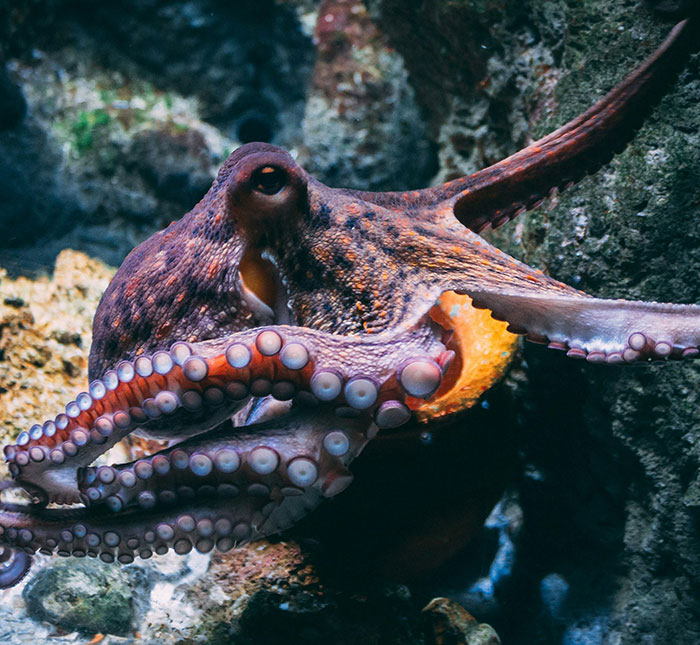
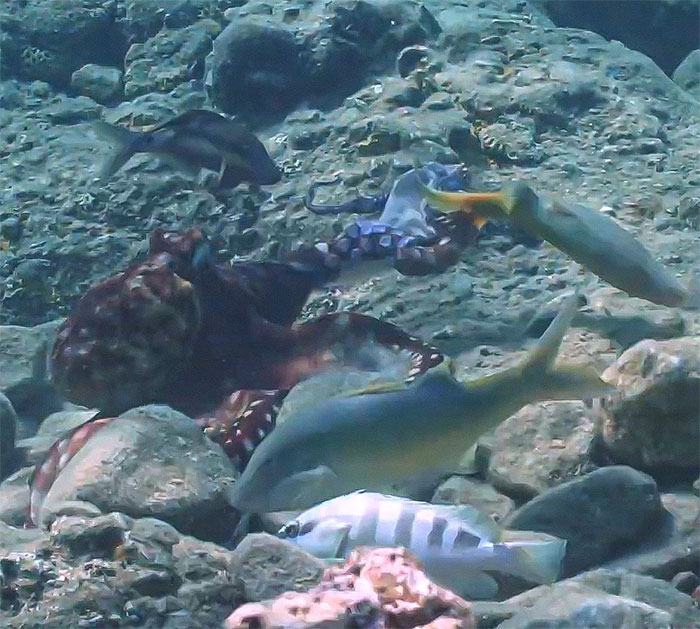
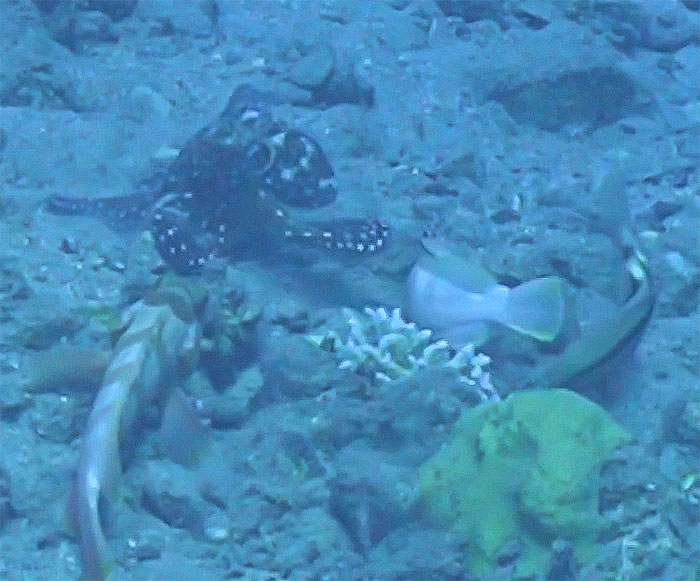
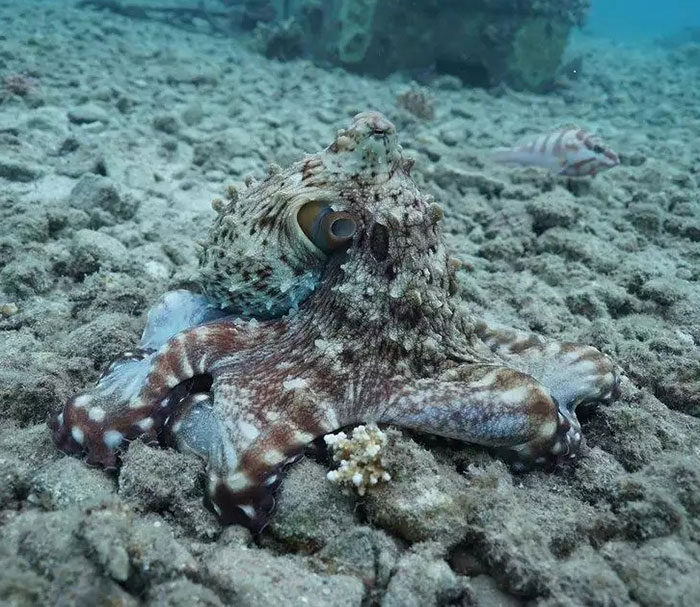
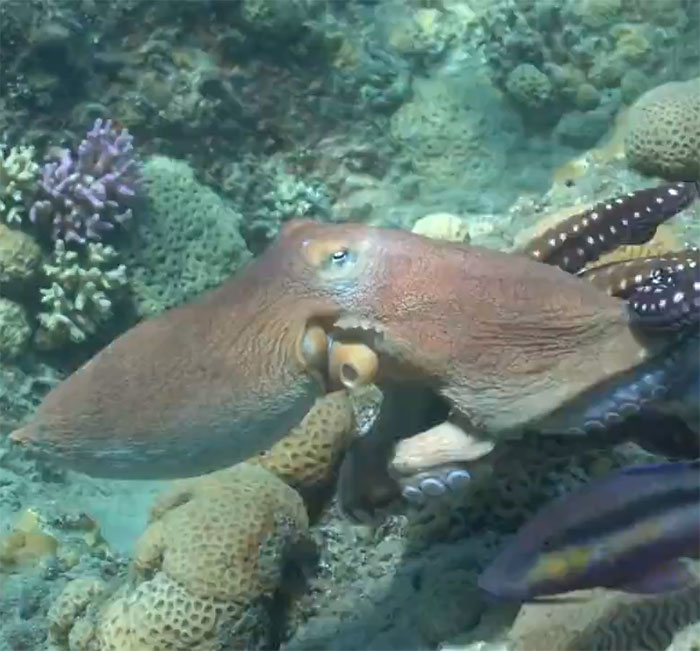























































42
10